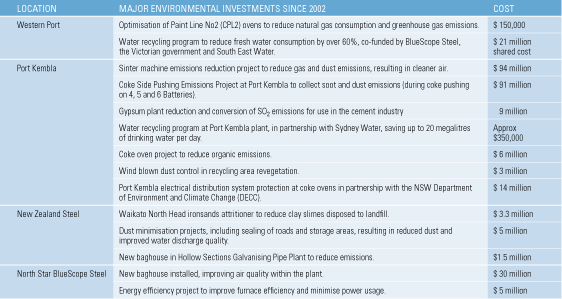Environment - Improving Our Performance

Steel is integral to the modern world. It is one of the most common and widely used materials, valued for its versatility, strength and recyclability. Steel can be used in a wide variety of environments, including extremes of cold and heat, and both arid and wet climates. The steel industry is also an important contributor to national and regional economies, providing employment and investment, generating exports, and supporting community programs. At the same time, we recognise that the communities in which we operate expect us to be responsible environmental managers and strive for improvement in our environmental performance. To ensure we achieve these goals, BlueScope Steel has comprehensive environmental governance arrangements and management systems. At the apex of these arrangements is the Health, Safety and Environment Committee of the Board of Directors. Amongst a range of governance responsibilities, this Committee adopts the Company’s Health, Safety, Environment and Community (HSEC) Policy. An environmental compliance management system is in operation at all of our sites globally, to ensure we comply with all relevant laws. In addition to our compliance obligations, BlueScope Steel has undertaken a range of initiatives to reduce our water consumption, reduce energy intensity, reduce waste, and cut greenhouse gas emissions. We are committed to monitoring and publicly reporting on our progress. Public reporting takes place through our participation in independent external reporting initiatives, such as the National Pollutant Inventory (NPI) and the Carbon Disclosure Project (CDP), and through initiatives such as this Community, Safety and Environment (CSE) Report. This report provides comprehensive information about BlueScope Steel and the environment, including governance and policy arrangements, performance measures, and case studies.
|

